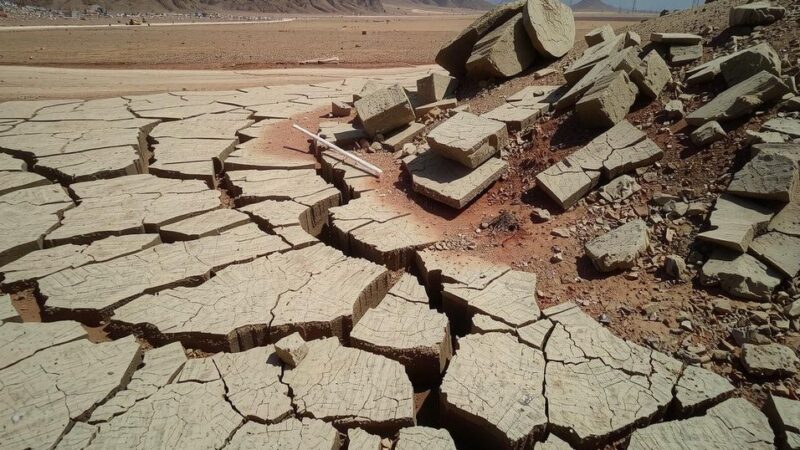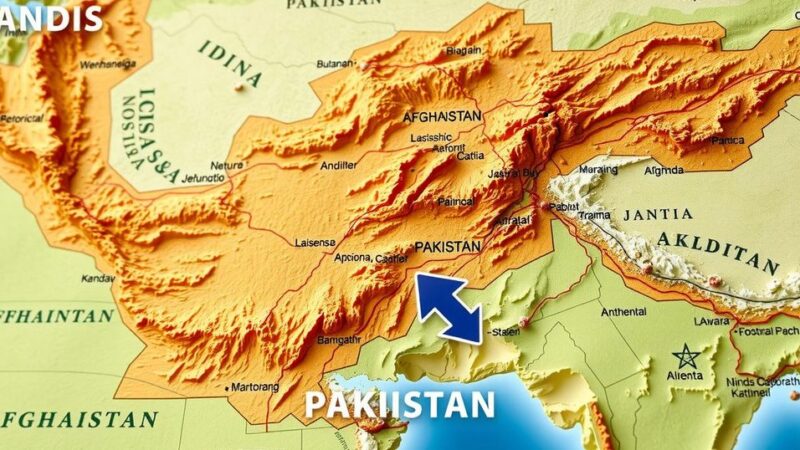The recent summit involving Egypt, Eritrea, and Somalia highlights a significant shift in the geopolitics of the Horn of Africa, mainly focused on encircling Ethiopia amid ongoing tensions. The summit leaders emphasized cooperation and territorial integrity while grappling with power dynamics surrounding the Grand Ethiopian Renaissance Dam and Ethiopia’s relationships with Somaliland and Somalia. Egypt’s military support to Somalia against al-Shabaab and the strengthening Cairo-Mogadishu alliance illustrate the shifting landscape. The evolving alliances pose potential risks for stability in the region.
Recent developments in the Horn of Africa have seen Egypt, Eritrea, and Somalia convening for a trilateral summit in Asmara, Eritrea, marking a significant shift in the geopolitical landscape of the region, which has long been plagued by instability and competitive power dynamics. The primary aim of the summit was the proclamation of a united front amid ongoing security challenges, with a notable focus on Ethiopia—Africa’s second most populous nation. While official discourse emphasized fostering cooperation and maintaining regional autonomy, the underlying intention appeared to encircle Ethiopia amidst simmering tensions concerning its influence and activities. Leaders Isaias Afwerki of Eritrea, Abdel Fattah al-Sisi of Egypt, and Hassan Sheikh Mohamud of Somalia underscored the importance of territorial integrity and resisting external meddling in their joint communiqué. The Horn of Africa’s intricate history is characterized by layered alliances and deep-seated grievances. Ethiopia’s central role in this complexity is noteworthy, particularly regarding its contentious agreements with Somaliland and prolonged disputes with Egypt over the Grand Ethiopian Renaissance Dam (GERD). The proposed deal for Ethiopia to gain a piece of Somaliland’s coastline for naval and commercial purposes has stirred significant controversy, adding to the already strained relationship with Somalia, which has yet to recognize Somaliland’s independence declared in 1991. In August, Somalia formalized a military agreement with Egypt, strengthening its security partnership with Cairo. Egypt’s provision of arms and military equipment to Somalia is aimed at empowering its fight against the al-Shabaab insurgency. Consequently, Ethiopia’s relationships with its neighboring countries are appearing to weaken as the Cairo-Mogadishu alliance strengthens. Although Ethiopia was not explicitly mentioned in summit discussions, the topics covered indicated growing concern over Addis Ababa’s actions in the region. Egypt’s long-standing rivalry with Ethiopia regarding the GERD remains a critical area of tension, with fears regarding the dam’s implications on Egypt’s vital water supply causing negotiations to stall. The filling of the GERD has heightened anxieties within Cairo, as Egypt’s military operations in Somalia play a significant role in countering Ethiopia’s expanding influence. Egypt’s provision of military support to Somalia, alongside its commitment to UN peacekeeping and anti-terrorism measures against al-Shabaab, showcases its broader strategy of stabilizing the Horn of Africa while fortifying regional alliances. For Eritrea, this emerging partnership is a consolidation of power—having sought to enhance its regional role after gaining independence from Ethiopia in 1993, despite lingering border disputes and rivalries that have impeded normalization of relations. Eritrea’s geographical position near the Bab el-Mandeb Strait underscores its strategic significance in controlling key maritime routes. Its alignment with Egypt thus serves to counterbalance Ethiopia’s rising stature. The Asmara summit signifies a potential redistribution of power within the Horn of Africa, as Egypt, Eritrea, and Somalia strive to establish military and regional hegemony, emphasizing their collective aim to mitigate Ethiopia’s influence. The implications of this partnership on regional stability and ongoing tensions remain uncertain. Furthermore, Egypt’s actions within the Horn of Africa raise concerns, potentially positioning itself toward a proxy conflict through its support of Eritrea. This poses heightened security risks for Ethiopia, especially considering Eritrea’s historical conflicts with the Tigrayan People’s Liberation Front. As the situation evolves, Ethiopia must act with urgency. Engaging in diplomatic efforts with Egypt and Eritrea is essential, augmented by a focus on international collaboration, notably with the United States, which values Egypt’s relationship as long as it does not compromise its obligations to Israel. Strengthening ties with Kenya and Sudan could yield a regional counterbalance. Establishing a framework for managing Nile waters is vital for reducing tensions, alongside enhancing public diplomacy to clarify Ethiopia’s objectives. Navigating these shifting alliances is crucial for Ethiopia’s future security and stability in this already fragile region.
The geopolitical dynamics of the Horn of Africa are historically complex, characterized by alliances and rivalries, particularly involving Ethiopia, Egypt, Eritrea, and Somalia. The area has endured chronic instability due to conflicted interests and external influences. Recent summits among Egypt, Eritrea, and Somalia reveal efforts to consolidate relationships against the backdrop of perceived threats that Ethiopia poses regarding water politics and territorial disputes, especially concerning the GERD and its implications for Egypt’s water security. The region has witnessed shifting allegiances, reflecting longstanding grievances stemming from colonial legacies and post-independence disputes, particularly around issues of sovereignty, governance, and national security, all of which contribute to the region’s tenuous stability.
In conclusion, the convening of the trilateral summit in Asmara between Egypt, Eritrea, and Somalia illustrates a strategic realignment in the Horn of Africa’s geopolitical landscape, echoing the need for each nation to bolster its influence in the face of Ethiopia’s growing power. As alliances evolve, the potential for increased instability may rise, necessitating diplomatic engagement and collaboration among regional powers to mitigate tensions and foster harmonious relationships. The outcomes of this summit may very well dictate the future trajectory of security and political dynamics within this volatile region.
Original Source: thehill.com







